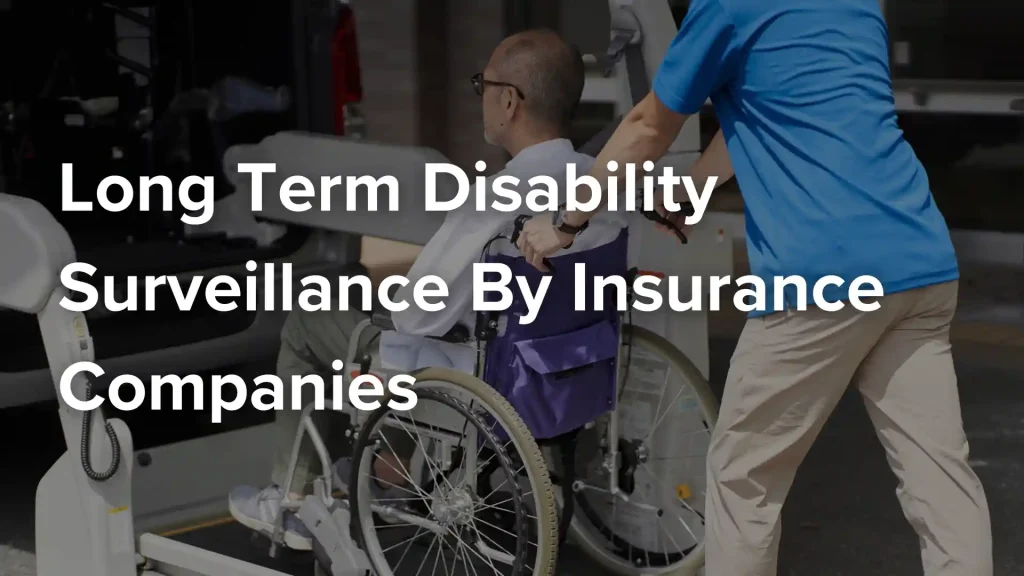Posted on Tuesday, April 22nd, 2025 at 9:00 am
 If you filed for long-term disability (LTD) benefits in Pennsylvania, you might assume the insurance company will only use the evidence in your claim to determine your eligibility. This is not the case. Insurance companies regularly perform thorough investigations to determine whether claimants are eligible for benefits and legal options. They include using long-term disability surveillance to monitor your daily activities and look for inconsistencies between your reported limitations and what they observe.
If you filed for long-term disability (LTD) benefits in Pennsylvania, you might assume the insurance company will only use the evidence in your claim to determine your eligibility. This is not the case. Insurance companies regularly perform thorough investigations to determine whether claimants are eligible for benefits and legal options. They include using long-term disability surveillance to monitor your daily activities and look for inconsistencies between your reported limitations and what they observe.
Surveillance can be part of these investigations and continue after your claim is accepted. While you might not like the idea of an insurance company investigator surveilling you, this is a common practice, and understanding how it fits into the insurance claim system can help you better prepare for it. So, what is surveillance in disability insurance? It’s a tactic insurers use to monitor your daily activities.
Why Do Insurance Companies Use Surveillance?
Insurance companies are in the business of making money. No matter what the insurance company representative says, they’re not on your side. To protect their bottom line, insurers sometimes place claimants under surveillance. They do this to try to find evidence that their claim should be denied or their benefits should be terminated.
The insurance company hopes to find evidence inconsistent with your condition description and its limitations through surveillance. For example, they may try to get proof that you are more mobile than you claim to be. And even if the activity the insurance company “catches” you engaging in is in line with your doctor’s limitations, it may still try to use it out of context to deny your claim.
Long-term disability surveillance can be misleading when clips are taken out of context, so it’s essential to document your condition clearly and consistently to protect your claim. A well-documented claim—with detailed medical records, doctor notes, and personal symptom tracking—can help counter any misinterpretation and strengthen your case.
Types of Surveillance Tactics Used by Insurance Companies
Some of the most common surveillance tactics used by insurance companies include:
- Photographic and Video Surveillance – Insurers may hire private investigators to stake out your home and follow you to observe and record your actions. However, these investigators are not allowed to trespass on private property.
- Social Media Monitoring – Insurers may also comb through your social media posts and the posts of your friends and family in search of things they can use against you. Long-term disability insurance companies often take these posts out of context.
- Interviews with Witnesses – Investigators may interview your friends, family, neighbors, and coworkers to gather additional information about your condition. Reminding them that they do not have to speak to investigators is essential.
- Employment Checks – If the insurance company suspects you are working while seeking long-term disability benefits, it may check employment databases and contact your former employer.
Is Surveillance Legal in Pennsylvania?
Generally, surveillance is legal in Pennsylvania as long as the investigators do not trespass on private property, use wiretapping, or violate reasonable expectations of privacy. For example, the investigator could film you publicly or take screenshots of your social media posts. But attempting to film inside your home or recording a phone call without your consent isn’t allowed.
How to Protect Yourself from LTD Surveillance
You can take a few simple steps to protect your LTD claim from the effects of insurance company surveillance. In general, you should:
- Be Honest About Your Condition – The best defense against and conduct surveillance is to be honest about how your condition affects your daily life so the investigator can’t catch you doing something that goes against your reported limitations.
- Follow Your Doctor’s Restrictions – Make sure you’re adhering to all limitations placed on you by your doctor. If you’re not supposed to drive or only be active for short periods, stick to those limitations so the insurance company can’t use any unauthorized activity against you.
- Limit Social Media Activity – It’s in your best interest to set all social media accounts to private and not accept friend or follow requests from anyone you don’t know. You should also tell friends and family not to post about you. The insurance company may be watching their accounts, too.
- Notify Your Attorney of Surveillance – If the insurance company’s surveillance makes you uncomfortable, notify your attorney. They may be able to get the insurance company to give you space.
What to Do If Surveillance Leads to an LTD Denial
 If the evidence gathered during surveillance leads to the insurance company denying your LTD benefit claim, it must inform you of the reason for the denial in writing. Once you determine why your claim was denied, you can file an appeal with additional evidence disputing the reported reason.
If the evidence gathered during surveillance leads to the insurance company denying your LTD benefit claim, it must inform you of the reason for the denial in writing. Once you determine why your claim was denied, you can file an appeal with additional evidence disputing the reported reason.
If the insurance company upholds the denial upon appeal, your next option is to file a lawsuit against it.
Contact Our Long-Term Disability Surveillance Lawyers
If you have concerns about your long-term disability claim in Pennsylvania, contact Capitan Law at (267) 419-7888 for a free consultation with an experienced disability lawyer in Pennsylvania. Our team is here to help you understand your rights and take the first step toward securing the necessary benefits. We’ll review your case, help you understand why the insurance company may place you under surveillance, and explain your options.
Related Post
What Is Voluntary Long-Term Disability Insurance?
What Is the Cost of Long-Term Disability Insurance in Pennsylvania?